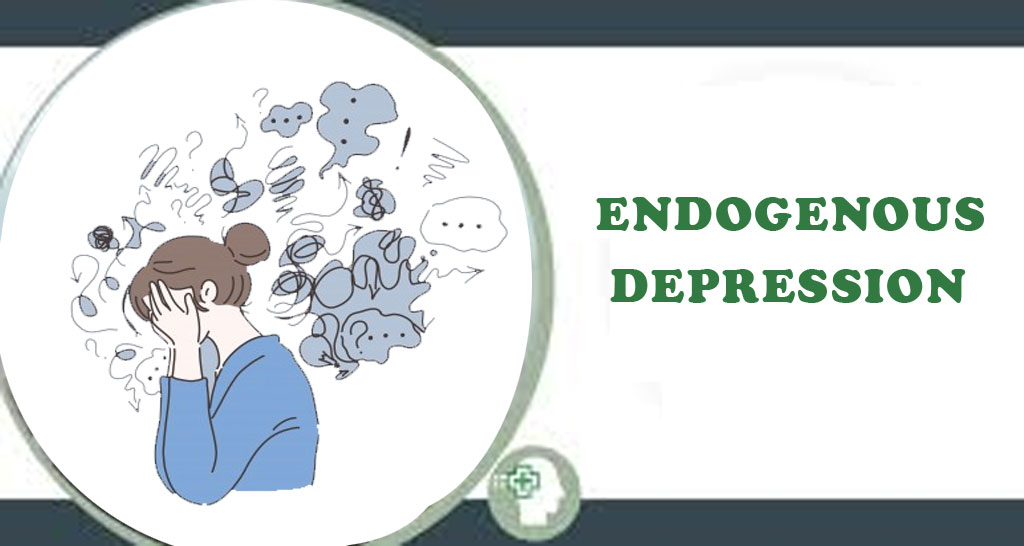Endogenous Depression
Endogenous depression is a type of major depressive disorder. It is also known as clinical depression, is a mood disorder, characterized as persistence and intense feeling of sadness. Further, these feelings consist a negative impact on mood and behavior and also on the various physical functions including sleep and appetite. It has been found in various researches that below mentioned facts are responsible for such change.
1.Genetic factors:
There are most likely genetic changes that can increase the tendency to depression. Scientist believes that genetic factor is responsible for depression in approximately 40 % of cases.
2.Biological factors:
Biological factors which have some effect on depression include genes, hormones, and brain chemicals. Depression frequently runs in families, which imply that individual may inherit genes which make them susceptible to developing depression.
3.Psychological factors:
Person who are suffering from Endogenous depression experience the symptoms of major depressive episode.
4. Environmental factors :
The environment also plays important role in exploring this type of depression. A non-cooperative environment in family, workplace, school, or college plays an important role in a depressive episode.
In some cases Endogenous depression occurs due to losing of loved one or consequent after facing a trauma. However in most of the cases Endogenous depression occurs without facing any stress full events or other cause.
Different symptoms of endogenous depression are discussed below:
- Feelings of sadness or hopelessness.
- Loss of interest in all the activities or hobbies especially those which were previously pleasurable.
- Exhaustion.
- Lack of motivation.
- Unable to make a decision.
- Loss of appetite.
- Sleeplessness.
- Social isolation.
- Muscular pain and headache.
- Suicidal thought.
Treatment :
Endogenous Depression or Major Depressive disorder (MDD) is no easy task. Treatment is very difficult and we have to treat the patient with Endogenous depression very cautiously. Symptoms are required to treat with medication as well as therapy.
Medication:
The most common medicine use to treat such type of patient is selective serotonin reuptake inhibitors(SSRI) and selective serotonin and nor epinephrine reuptake inhibitors (SNRI).
In some cases of we can advise tricyclic anti-depressant medicine in restrictive and rarely. As anti-depressant medicine increases levels of certain brain chemicals which decrease the depressive symptoms.
SSRIs are a kind of antidepressant medicines. these may be taken by people suffering from MDD. It includes:
- Paroxetine.
- Fluoxetine.
- Sertraline.
- Escitalopram.
SNRIs are another kind of antidepressant medicines. It may be taken by the people suffering from MDD which include:
- Trimipramine
- Impiramine
- Nortriptyline
Side effects of SNRIs are more serious than those of other anti-depressants. It may cause drowsiness, dizziness, and weight gain. It is advised to read out the information mentioned on the leaflet of the medicine while taking medicine. This medicine for the proper treatment of Endogenous depression is usually be taken a minimum of 4 to six weeks period and continues for a period of up to 12 weeks to observe the improvement in symptoms taken place.
In case certain medicine does not seem to be working, it is better to switch on to another medicine. As per the National Institute of Mental Health, a patient suffering from Endogenous depression do not get better after taking the first medication, had a much better chance of improving when they tried another medication or a combination of treatment.
Take a note that above medication is required to be taken only under the strict supervision of a doctor specialist in the concerned field and further on completion of treatment or in any circumstance medication should be stopped gradually.
Psycho therapy :
The psychotherapist also plays an important role in the treatment of endogenous depression. In other words, we can say talk therapy, involves meeting with a therapist on a regular basis which helps to reduce symptoms gradually. The patient is required to do act as per the advice of the therapist such as;
- To do morning walk on regular basis
- Do physical activity or exercise regularly.
- Take proper sleep approximately 6 to 7 hours daily.
- Maintain a healthy diet plan.
In the above circumstances, if the patient takes proper medication and does work and activity as per the advice of the therapist, he will definitely recover from the illness gradually.
